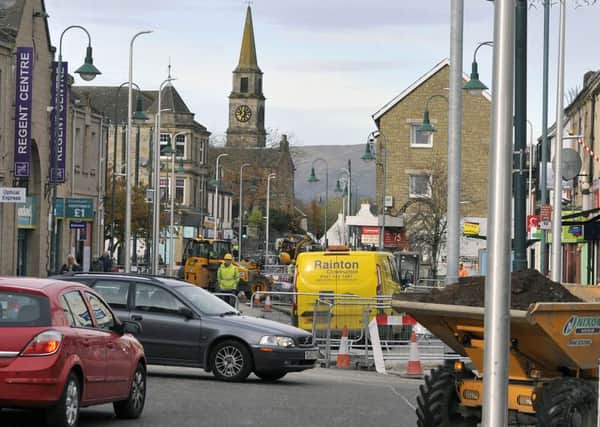Anti-shared space campaigners claim victory after damning report by MPs


The UK Parliament’s Women and Equalities Committee has said the Government should call a halt to all local shared space schemes pending “the urgent replacement” of national guidance to take into account disabled persons’ views and needs.
Thousands of people have been campaigning against the introduction of the new road layout at Kirkintilloch because of safety fears but East Dunbartonshire Council’s ruling administration have ploughed ahead regardless.
Advertisement
Hide AdAdvertisement
Hide AdThe Transport Network website reported that the committee goes on to state the new guidance — to replace the 2011 Local Transport Note — should instruct local authorities “that controlled crossings and regular height kerbs are to be retained”.
MPs made the recommendation after hearing a “striking” amount of safety concerns from a range of witnesses. One blind person said he had been ‘left stranded in his new home’ after a shared space scheme was built outside his front door.
Published yesterday, its report Building for Equality: Disability and the Built Environment, also calls on government to ensure advice is available ‘on how to challenge local authorities on existing or new schemes which exclude or have the potential to exclude disabled people’.
‘We recommend that the Government bring forward Regulations under section 22(2)(a) of the Equality Act 2010 to specify that organisations which fail to comply with the new guidance will not be considered to have taken reasonable steps for purposes of the duty to make reasonable adjustments.’
Advertisement
Hide AdAdvertisement
Hide AdThe MPs say the new shared space guidance should: ‘be developed with disabled people;
explicitly address the needs of all disabled people, including but not limited to people who are blind and partially sighted, people who have ambulant mobility difficulties and people with a neuro-diverse condition or learning disability;
lay down consistent national standards so that disabled people can navigate, learn and independently use such schemes anywhere in the country;
be clear that safety and usability requirements, such as controlled crossings and kerbs, are not optional;
Advertisement
Hide AdAdvertisement
Hide Adprovide details on how the requirements of the public sector equality duty and the duty to make reasonable adjustments apply to the design and implementation of such schemes.
When questioned by the committee on the idea of a moratorium on shared space, first suggested by Lord Holmes of Richmond, transport minister Andrew Jones rejected the idea stating ‘we can’t really say there will be no works on the urban realm while we work this out’.
The MPs accuse the Government of not having ‘grasped the seriousness of the barrier to inclusion that certain features (or the lack of certain features) present to so many disabled people’.
They also expresses concern that the Government ‘now appears to expect the results of the review of shared spaces by the Chartered Institution of Highways and Transportation to be the identification of gaps in evidence—not new guidance’.
Advertisement
Hide AdAdvertisement
Hide AdThis leaves ‘no clear plan to address the lack of a common approach on shared spaces that takes full account of the extensive concerns of disabled people and the organisations that represent them’.
While the term shared space is something of a catch-all, in general it is associated with the removal of demarcations between pedestrians and cars to deliberately create an environment where drivers must take more notice of their surroundings and drive slower.
Lord Holmes, who gave evidence to the Committee’s inquiry, said: “I’m delighted that the committee agree with my recommendation that a moratorium on shared space schemes is necessary. Local authorities require clarity in this space and the exclusion of people from their communities and potential waste of public money must end.
“The impact on people’s lives when public spaces are not accessible is devastating. Inclusive design must be the golden thread that runs through all new buildings and works in the public realm.’
Advertisement
Hide AdAdvertisement
Hide AdAnti shared space campaigner and filmmaker, Sarah Gayton said: ‘We have won. There is no turning back now after this damning report. We instead need to focus on working together to deliver safer and inclusive streets for all.’
The Department for Transport have declined to comment due to purdah restrictions.
The Herald has requested a response from East Dunbartonshire Council.